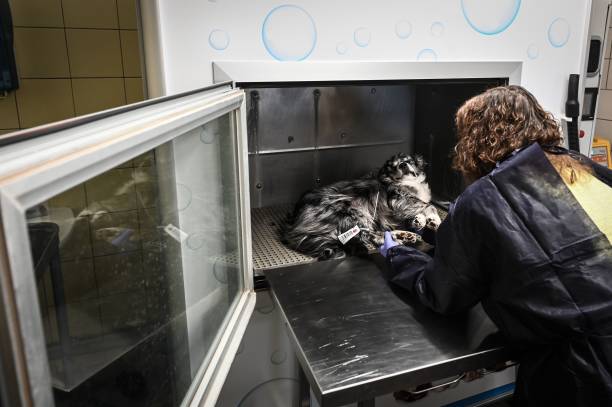
Crematorium worker dismissed for mixing pet ashes
An unfair dismissal claim of a crematorium worker who “purposefully” mixed the ashes of pets has been rejected by a UK tribunal. This unfair dismissal case – Mr. J Hamilton v North East Lincolnshire Council [2022]. Is one of the more strange ones we’ve come across (and we’ve seen a few.) In this article, we take a look at the bizarre events of this case. We also share three other cases to come before UK tribunals, with similarly morbid undertones. Workplace relations and dismissals and in dealing with the deceased seems a world on its own. Crematorium worker dismissed is interesting reading.
Unfair dismissal: Crematorium worker suspended and dismissed for mixing pet ashes
In late 2019, Jack Hamilton swapped his career in the hospitality industry for a very different vocation, becoming a crematorium technician for the North East Lincolnshire Council. As part of his role, Mr Hamilton underwent extensive training, which involved cremating over 100 human bodies.
Two months after earning his qualifications in cremation, he started cremating the remains of pets, which follows the same process as doing so for humans. As part of the pet cremation process, Mr Hamilton was required to “de-ash” the remains from the cremulator. This ensured that the cremated remains of different humans or pets weren’t mixed.
The incident leading to employees suspension and dismissal
In December 2021, Mr Hamilton’s manager and another colleague discovered that he had been mixing the cremated remains of pets. When loading a pet into the cremulator, they realized that the cremated remains of a pet were still in there. In a risk assessment report conduct by the manager, he said that “a large amount of ashes had been pushed to the rear of the chamber.” It was clear to the duo that this had been done in an effort to deliberately conceal the ashes.
Upon removing the remains, the manager discovered that it “contained several bone fragments and was clearly from an animal that we had cremated.” He also noticed that Mr Hamilton hadn’t filled out the required paperwork for three previous cremation sessions. It also later came to light that he hadn’t conducted daily checks of the cremulator. Mr Hamilton was subsequently placed on suspension pending disciplinary action. In the letter outlining as much, he was told that his failure to de-ash the cremulator could potentially cause “significant risk of reputational damage for the Council.”

Employee denies allegations while on suspension, faces disciplinary action
During subsequent investigatory interviews, Mr Hamilton said that he would have removed the ashes of the two pets the following day after they had cooled. He denied pushing the remains to the back of the cremulator. He also denied failing to follow correct procedure.
Further allegations were made against Mr Hamilton while he was suspended pending disciplinary action. This included:
- Spilling cremated remains on the floor and leaving them there.
- Failing to complete housekeeping duties and wear his uniform.
- Failing to complete the scattering of ashes and place funeral flowers as directed.
- Failing to clean a memorial bench and challenging the removal of floral tributes.
- Falsifying timesheets when working alone.
Mr Hamilton was later invited to a disciplinary action hearing in which the Council dismissed him for serious misconduct. He subsequently made an unfair dismissal claim with the UK employment tribunal.
Tribunal finds employee was fairly dismissed
At Mr Hamilton’s unfair dismissal hearing, the UK tribunal found that there was sufficient evidence to support the Council’s allegations. It also found that its investigation conducted while Mr Hamilton was suspended and facing disciplinary action was sound.
The tribunal ruled that the dismissal “fell within the band of reasonable responses open to a reasonable employer.” This was because Mr Hamilton’s actions could have resulted in “serious reputational damage to the [council] and may have seen it lose its license for undertaking pet cremations altogether.” The tribunal therefore ruled that Mr Hamilton’s dismissal for serious misconduct had been fair and reasonable.

Unfair dismissal: Mortuary worker who developed fear of bodies wins huge payout
Another morbidly bizarre unfair dismissal case that came before a UK tribunal is that of Lorraine Capener. While working as a mortuary technician at a hospital in Liverpool, England for over 21 years, Ms Capener had developed a morbid fear of bodies. In 2004, she took sick leave due to this fear and was subsequently dismissed by the hospital. Ms Capener then made an unfair dismissal claim with a UK tribunal, which heard how during her employment she had developed an “unhealthy obsession with death.”
During her tribunal hearing Ms Capener expressed how the hospital’s handling of her dismissal caused her increased depression and post traumatic stress disorder. The hospital was chastised by the tribunal for worsening her anxiety by forcing her to make an unfair dismissal claim. The hospital’s treatment of Ms Capener was deemed by the tribunal as “insensitive and incompetent.” It ordered the hospital to pay her over £15,000 (around $26,000 Australian) for injuring her feelings and unfairly dismissing her.

Unfair dismissal: Mortuary worker dismissed for embalming wrong body
This unfair dismissal case heard by a UK tribunal way back in 2002 involved a mortuary worker who made a huge blunder. And the worker’s excuse for the blunder is a very curious one.
Dawn Weller, 33, who worked for Dignity Funerals in the UK, had mixed up two bodies, causing her to embalm the wrong one. The mistake came to light after the family of 61-year-old Christopher Learnihan attended a viewing at the funeral home. They quickly noticed that their beloved family member wasn’t in the coffin, but instead it was the body of another man, namely 72-year-old Frederick Bates.
The mix-up took place when two drivers arrived to collect Mr Learnihan’s body from the hospital. They were accidentally given the body of Mr Bates, who was wearing a tag bearing his name. But believing that they had Mr Learnihan’s body, the drivers put their own tag on the body bearing Mr Learnihan’s name. The drivers then delivered the body to the Dignity Funerals mortuary, where it was received by Ms Weller. She didn’t notice that the body had two name tags with different names on them, and so went ahead with the embalming.
Ms Weller was subsequently dismissed for the mix-up and later made an unfair dismissal claim with a UK tribunal. Ms Weller claimed that the mix-up was the result of her dyslexia, as she wasn’t able to tell the two bodies apart based on their tags. She also blamed her colleagues at Dignity Funerals, who she said should have identified the body mix-up and given her more support. She said that she had “repeatedly told my colleagues and everyone knew I was dyslexic.”

Employee had dyslexua
Dignity Funerals’ arear manager however told the tribunal that while they were aware that Ms Weller has dyslexia, “she did not ever raise dyslexia as an issue which caused her difficulty in carrying out her job.” The tribunal ultimately ruled that Ms Weller had not received an unfair dismissal. In Australia there is clear case law you must inform your employer if you have any illness, medical condition or disability that effects your ability to perform your job. Now that sounds fair enough, but many employers will not employ you if your have a issue. Its called worrying about your workers compensation premiums.
It gets more complicated when at the time of your employment any condition you may have had did not effect your ability to perform your job. Then as the years go on, now it does. Or its intermit. Or now you need extended periods of time off to deal with it. Is it easier and less trouble not to inform your employer and hopefully you can get by? Get advice from your medical advisor and get sound workplace advice.

Unfair dismissal: Undertaker removes identification tags from bodies to smear co-workers
And finally, we have one last morbidly bizarre unfair dismissal case from the UK. This one involved undertaker’s assistant Sharon Conway, who was dismissed in 2012 for allegedly taking identification tags off a body in an attempt to smear her co-workers. 43-year-old Ms Conway, who had for the past five years worked for funeral home in Glasgow, Scotland, had allegedly removed the tags from the wrists of a dead woman in March 2012. However, her employer noticed what she had done and subsequently launched an investigation into the incident.
Mr Conway was later dismissed for removing the tags and subsequently made an unfair dismissal claim with a UK tribunal. The funeral home claimed that she had the motive to incorrectly tag the bodies and that it was done to discredit her co-workers. At her tribunal hearing, she claimed that a number of bodies had been incorrectly tagged in the past. She also said that two bodies had also been dressed in the wrong clothes. Ms Conway also claimed that she was accused of removing the tags because she had complained of discrimination at the funeral home, where she was the only female employee.
Sacred duty in funeral homes
However, the funeral home’s operations manager slammed Ms Conway for her actions. He told the tribunal that staff at the funeral home had a “sacred” duty to ensure the correct tagging of bodies. And the manager said that “anyone who interferes in that procedure is showing no respect for the dead.” The manager also said that Ms Conway’s actions could have forced the grieving family of the incorrectly tagged body to have to formally identify it for a second time.
The case was adjourned in 2013 and it’s unclear whether the tribunal ruled in favor or against Ms Conway having received an unfair dismissal.

Conclusion to: Crematorium worker dismissed for mixing pet ashes
A Whole New Approach is a workplace advisory firm that helps the employees who have been subjected to issues (unfair dismissals amongst others) in the workplace. AWNA make the dishearten employees believe they are superheroes. Who can achieve anything and fight for justice and compensation. They have been working in this area for 20 years. Over these years they have learnt, gained the clients and public’s trust and have helped the disadvantaged accomplishing for what they have been struggling for.
A lot of people fear sharing their sorrows or struggles with anyone. The fear of being criticized, judged or difficult times ahead make them suffer alone. At AWNA, the people subjected to constructive dismissal or any other kind of issue are known as “Warriors”. The first thing that motivates and enables them to fight for their right is the title given to them. Secondly, AWNA ensures that anything shared with them remains confidential. This also makes the warrior feel relaxed and they can further share their struggles and what they want.
We are all warriors
AWNA enables the warriors to gain what they want without any extra struggle or stress. It is a safe place where your worries are blown away. So if you are the victim of constructive dismissal, false accusations at work. Or stuck in difficult situation regarding sick leave call is immediately. Or if you know anyone who is suffering from an issue of this kind at workplace, refer them to AWNA today and seek justice with proper guidance. All Fair work Commission matters, including serious misconduct, toxic workplace, general protections anything to do with the workplace.
Call us on 1800 333 666 for sound, prompt, confidential advice
Articles similar to: Crematorium worker dismissed for mixing pet ashes
Unfair dismissal payout how much can you receive






